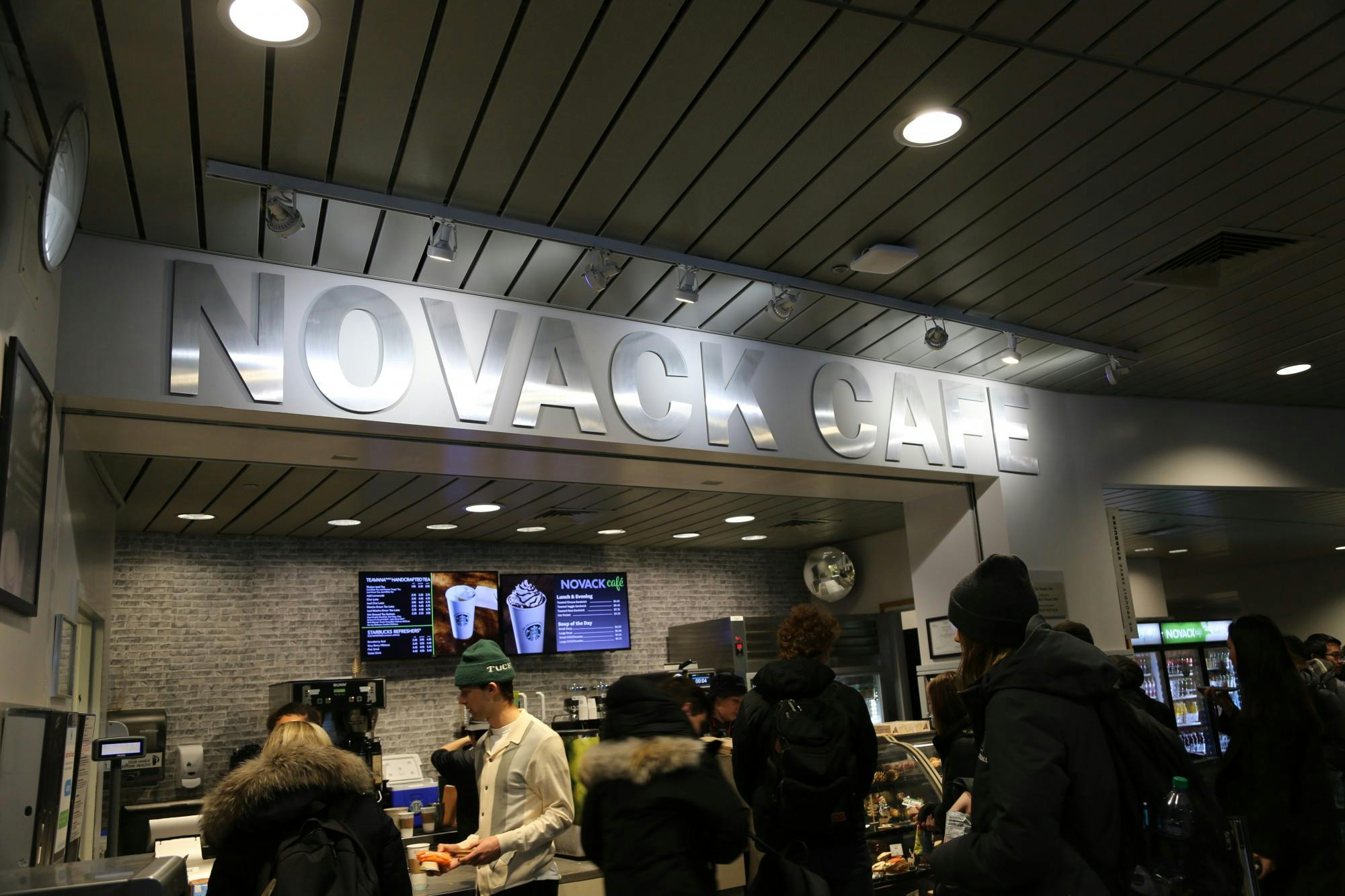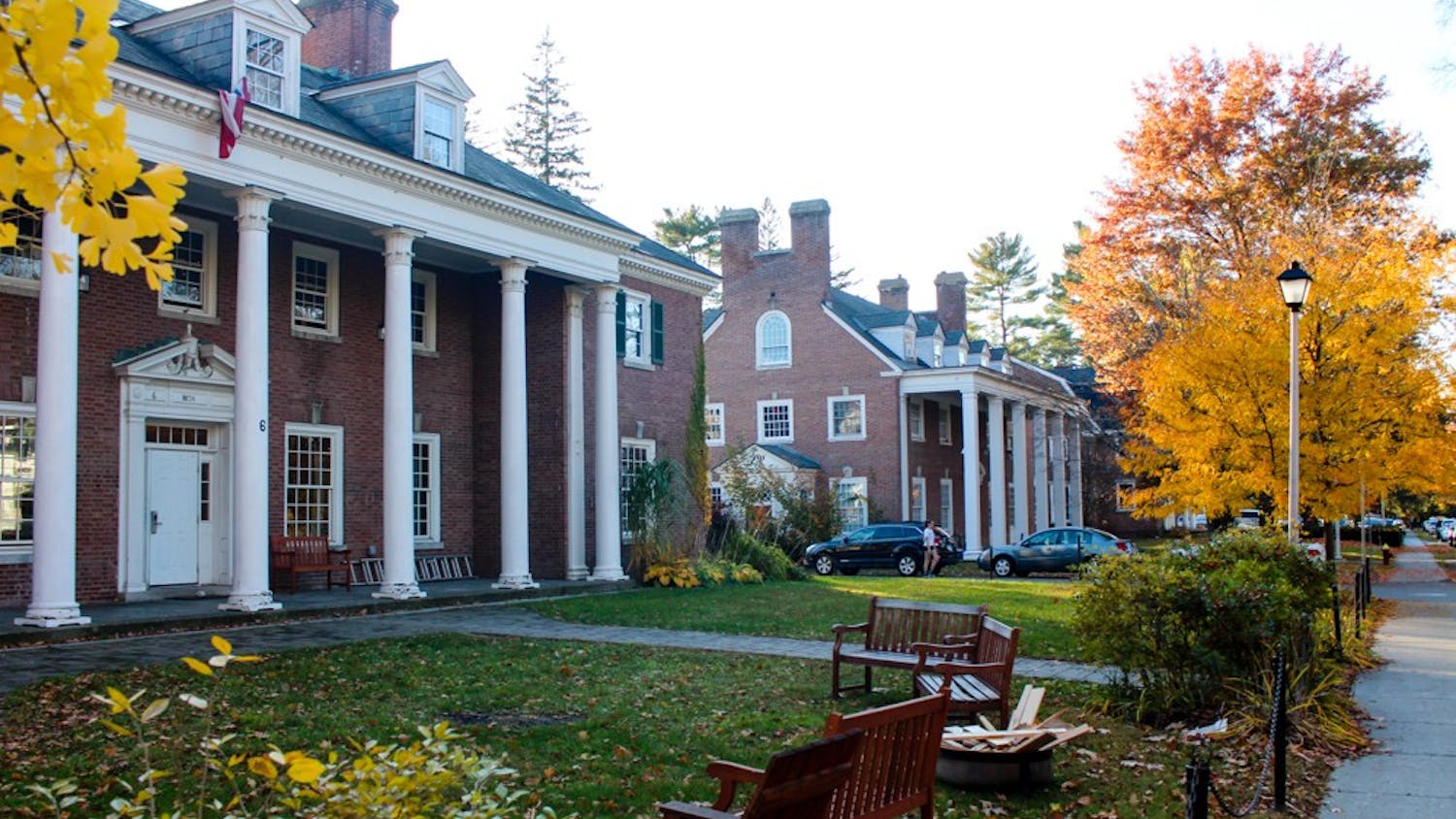Tuesday morning, I wake up at nine, get dressed and walk three minutes to Novack. A blast of warm air greets my face as I enter the cafe, followed by the voices of students in Zoom classes or friends chatting while they wait for their orders. Throughout this term, the line to buy my venti Pink Drink and egg and cheese croissant has grown longer. What was once a three-minute trip now takes 15 minutes, and I almost arrived late for my Native American studies class last week.
Novack Cafe, a study area at the northern end of Baker-Berry Library, seems to be one of the few places on campus where students can enjoy college life this term. The socially distanced crowd of masked students, along with the plexiglass separating workers and customers, doesn’t deter from the relaxed environment and welcoming workspace that attracts students from all across campus.
Jacob Gomez ’24 said that Novack is a social space where he and his friends can hang out and get late night snacks.
As a first-generation, low-income student and a Native American at Dartmouth, Gomez has noticed a lack of spaces that feel comfortable on campus. Although the library, Collis and other spaces are also currently open, Novack has felt the most welcoming because the cafe’s lively atmosphere reminds him of home. Novack is also where Gomez has built friendships with students of similar backgrounds, including other FGLI students.
According to Novack employee Melissa Barales-Lopez ’22, the cafe has traditionally been a place for FGLI students to gather.
“I think one of the really cool things about Novack is that it’s no one’s space, while being everyone’s space,” Barales-Lopez said. “But in terms of the cafe itself, it’s important and holds a unique significance to FGLI students above everyone else.”
This relationship between FGLI students and Novack extends behind the counter. Barales-Lopez recounted that she chose to work at Novack her freshman winter to meet more students, especially after having a lackluster freshman fall. While working at Novack, she found a community with fellow FGLI students. She values this community so much that she decided to work two shifts at the cafe this term.
“I think of all my coworkers as friends who I can connect to on more than a superficial level, that I can talk to about real things, like when I’m not having a particularly good day,” Barales-Lopez said.
For many FGLI students, Novack is not just a place to feel welcome. As a first-year FGLI student, I see Novack as the perfect study spot, one where I can gather with fellow students who come from backgrounds like mine. And of course, it’s also a convenient place to grab meals.
Novack supervisor Vincent Chang ’21 noted how drastically the cafe has changed since he started working there his freshman fall. While the cafe currently offers a wide variety of Starbucks products, Chang said “it just used to be a counter and a mini oven.”
In addition to offering an improved menu, Novack has been one of few indoor study spaces open on campus during the pandemic, which means the cafe is receiving more foot traffic than in past terms.
“Certain shifts, particularly closing shifts or night shifts this term, have been inundated with people — and that wasn’t the case before,” Barales-Lopez said.
Despite the increased traffic, Barales-Lopez noted that due to COVID-19 restrictions, the cafe feels quieter and less “vibrant” than usual. “It's so hard to hear people through the plexiglass, and we also have to be mindful,” she said. “We have to ask people to repeat themselves, and we can’t be blasting music like we used to.”
In past terms, Novack workers enjoyed creating a lively environment behind the counter. However, Barales-Lopez said that this sometimes prompted judgment from other students, as well as explicit conversations about Novack workers on Librex.
“I feel like there’s this reputation that Novack is not the most welcoming space to people. The perception is that Novack workers are rude, and I think that in and of itself is a display of racism or some sort of racial bias,” she said.
Barales-Lopez said that these perceptions likely stem from the demographics of the workers, many of whom are people of color.
“A good chunk of workers identify as Latinx … There have been attacks against [our] music choices, and all of these have been thinly veiled expressions of discrimination and racism. It's definitely discouraging to see that,” she said.
This term, Novack has become more subdued because of COVID-19 restrictions, while also becoming increasingly popular for all students. As a result, the cafe has become less of a community space for FGLI students, and some FGLI students feel like they have lost a valuable gathering place on campus.
These changes aren’t necessarily discouraging, but rather highlight the need for Dartmouth to create spaces for FGLI students. Barales-Lopez outlined a few changes that could help FGLI students feel more welcome at Dartmouth.
“[The First Year Student Enrichment Program] got a really large grant last year, which allowed them to elongate the pre-orientation program. But I think the next step is creating safe spaces — we could use more of those on campus,” Barales-Lopez said. “I think it's something that Dartmouth is definitely lacking, and something that could enrich the experience of many FGLI students.”
As a FGLI freshman, I haven’t been able to experience the former energy of Novack. Like other FGLI students, I regret the lack of spaces at Dartmouth that feel safe and inclusive for my community. But I still enjoy spending entire days in Novack, grateful that one of the most welcoming spaces on campus is just a three-minute walk from my dorm.
As students, we all deserve spaces where we feel at home. Until we have more spaces on campus, I’ll still pack my laptop into my tote back, and head — whether in rain or snow — to Novack Cafe.
Daniel Modesto ’24 is the News executive editor. He is from Brooklyn, New York, and is a Native American and Indigenous Studies major modified with Latin American, Latino and Caribbean Studies.




